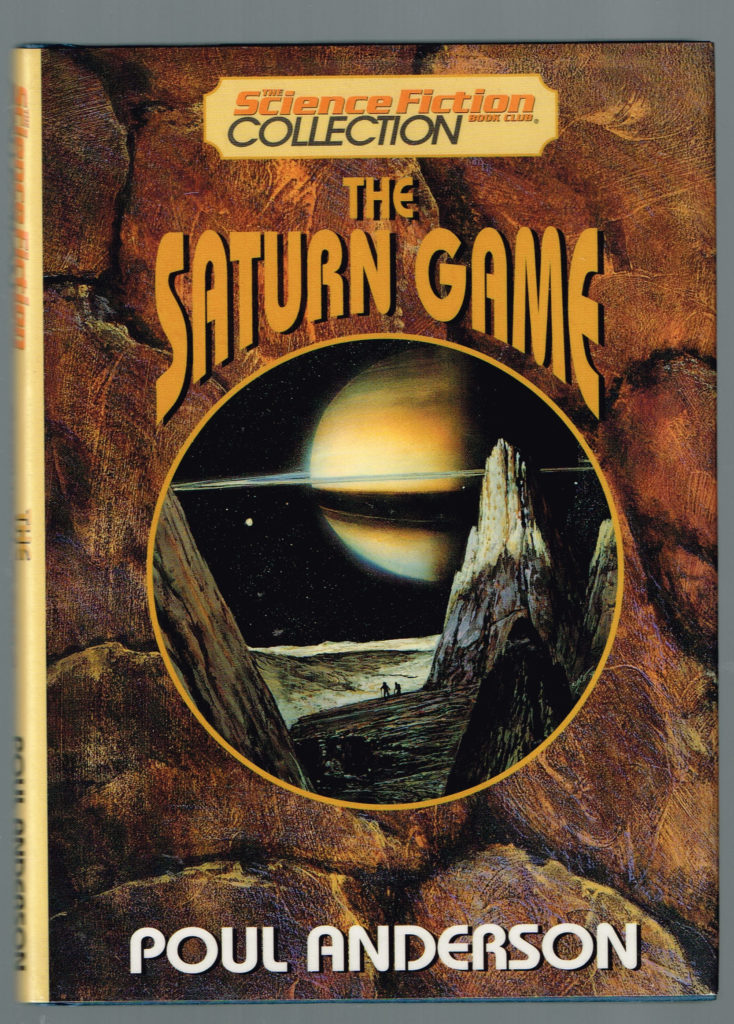
“The Saturn Game” won the 1981 Nebula Award for Best Novella and the 1982 Hugo Award for Best Novella. I picked up this edition in The Science Fiction Collection series (you can read my review of another volume in The Science Fiction Collection here).
“The Saturn Game” centers around imaginative roleplaying that provides relief for some of the crew on the long, dull flight to Saturn. However, the crew’s imaginary world becomes hazardously confused with the real world when a team of crew members begins the exploration of Iapetus, one of Saturn’s moons.
Poul Anderson, one of my favorite Science Fiction writers, always blended cutting edge technology with SF adventure to produce compelling stories. “The Saturn Game,” both ground-breaking and suspenseful, deserves the awards it won. GRADE: A
Anderson the most thoroughly “embedded” young writer in both PLANET STORIES and ASTOUNDING SF in the early ’50s…among many others, as well….
How big is the type in this book? How much white space? It’s 150 pages, and this is a 50-page story.
This is the first story in Poul Anderson’s Technic Civilization series (though one of the last ones written). I’ve never quite understood its connection to the other stories, which start a hundred years later. It’s a good story, though. As the first story, it’s in the first volume of the Baen Books unified series, seven volumes collected from 2008-2010. That volume, The Van Rijn Method, has two of my favorites in “The Man Who Counts” and “Hiding Place.”
When I looked at my bookshelves recently, I saw a bookmark in the second volume, David Falkayn: Star Trader. I picked it up to finish it, the last three of seven stories, but I decided to start again from the beginning. So far, none of these are Favorites, but they’ve all been good.
This series started as two separate series, the Polesotechic League stories about an interstellar trading company set in the 25th century, and the Dominic Flandry stories about a James Bond-ish character in the 31st century. After writing both for a while, Anderson decided that they took place in the same timeline, and along with those two series wrote other stories set before, after, or concurrently with the main sequences. The final overarching series begins around 2050 with “The Saturn Game” and ends around 7100. I’ve read scattered pieces over the years, and expect to eventually read them all since they’ve been collected. But obviously I’ve been in no real hurry, despite the fact that I’ve always considered this a favorite among sf series.
Jeff, Heinlein started the “Unified Series” concept and other SF writers like Poul Anderson eventually fell in line. As a kid, I loved the Dominic Flandry stories. A little later, maybe mid-1960s, I got into the David Falkayn and Van Rijn stories. I still have plenty of Poul Anderson to read (and re-read) since he was so prolific.
And while Heinlein did, with Campbell, construct a “Future History” timeline, others were constructing that sort of thing even earlier, with various series stories…
Todd, Poul Anderson remained popular with the ANALOG readership for decades. In fact, that’s where “The Saturn Game” was first published.
Alas, PLANET STORIES folded in ’55, but Anderson was happy to contribute to ASIMOV’S SF ADVENTURE MAGAZINE, so striving to be in the PLANET tradition that Anderson revised (slightly) one of his PS stories for the first issue in ’78…I was thinking he didn’t write much for GALAXY, but this is only true in comparison to the reams he wrote for F&SF as well as ASTOUNDING/ANALOG…and eventually AMAZING/FANTASTIC. In fact, both the first issues of FANTASTIC and F&SF I read featured Anderson fiction: THE BYWORLDER part 1 in the June 1971 FANTASTIC, and “A Feast for the Gods” by Karen and Poul Anderson, in F&SF for Nov ’71 (both then “old” issues, in ’77)…
Todd, Poul Anderson also wrote for the many original SF anthologies that were popular in the Seventies and Eighties.
This sounds like a good premise.
Patti, I loved “The Saturn Game” when I first read it back in 1981 and loved it again when I re-read it last week.
I agree, I like the sound of the premise. Since it is part of a long-running series, can it stand alone?
I also read your review of PRESS ENTER By John Varley, and that one sounds good too. I have not read anything by Varley.
Tracy, it definitely stands alone. It has nothing to do with any of the other stories. Actually, back when these were written, there wasn’t much in the way of “story arcs” like there are today. Very few of these even referred to events in other stories. In that sense, even if two stories feature the same character, they’re both stand-alones.
Jeff, thanks for clarifying that. I often wonder about that when I read about classic science fiction authors that I am not familiar with.